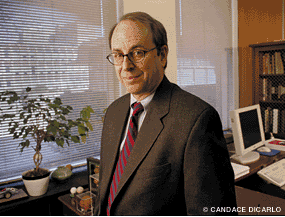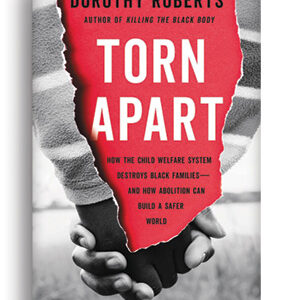
In the eyes of Dr. Richard Gelles, the School of Social Work was already positioned to make a great leap forward by the time he took over the dean’s office on an interim basis in September 2001.
“Ira Schwarz turned the School of Social Work into the hidden gem of the University of Pennsylvania,” says Gelles, referring to the school’s former dean, who left Penn to become provost of Temple University. “Our task now is to place ourselves collectively as one of the legitimate jewels of the crown.”
Gelles, who was named the school’s permanent dean this past February, is well known for his sharp, incisive opinions, and is quick to point out that phrases like hidden gem and jewels of the crown are clichés. But that doesn’t make them any less accurate.
“I think the work of our faculty is significant enough to warrant a place in the crown,” he adds. “I’m worn out explaining to people what we do and have them say, ‘I didn’t know social workers did that.’”
Even before taking on the deanship, Gelles himself was already wearing quite a few hats. In addition to holding the Joanne and Raymond Welsh Chair of Child Welfare and Family Violence, he has been serving as director of the Center for the Study of Youth Policy (soon to change its name to the Center for Research on Youth and Social Policy) and as co-director of the Center for Children’s Policy, Practice and Research [“The Children’s Crusaders,” May/June 1999].
His reputation as a researcher and public-policymaker—not to mention his strong administrative track record—made him “uniquely qualified” to lead the school, said Provost Robert Barchi Gr’72 M’72 GM’73. Penn President Judith Rodin CW’66 described him as a “distinguished scholar and researcher whose superb academic judgment and leadership skills make him the best possible person” for the deanship.
His first priority centers around the drab and decrepit Caster Building, which Gelles says “has dramatically outlived its usefulness, physically and programmatically.” The fact that it has no research space “sends the wrong message—that research is not an integrated part of the school,” he adds. “The reality is that to be a good social worker, you need to be a good researcher.”
If all goes according to plan, the school will not only rehabilitate the Caster Building but will add 10,500 square feet of research and classroom space by the time it celebrates its centennial year in 2008. Based on his conversations with Rodin, Barchi, and the trustees, he believes that to be “very doable” —though by no means easy.
“Everybody’s trying to raise money in a sour economy,” he acknowledges. “But I think this school has more than one compelling story, and that’s the key to fundraising success.”
Gelles’s second goal is to “reposition the School of Social Work in terms of our mission and goals and education of our core students—the MSW students—with our overarching goal of educating them to become agents of social justice.
“There was a period of time when the school’s core constituency was men and women who sought to become psychotherapists,” he explains. “As we developed a multidisciplinary faculty, we recognized that educating psychotherapists was only one part of a larger mission. Psychotherapists only change the world one client at a time—if they’re good. That’s retail social work.”
He would like to see an increase in “wholesale social work,” which involves enacting programs or social policies “that change a whole community, or that affect hundreds of thousands of children or families.” Gelles has considerable experience on that front, having helped draft the federal Adoption and Safe Families Act in 1997 and having testified before Congress on numerous occasions.
His third priority is for the school to “take a significant position in the Urban Agenda part of the University’s new strategic plan.” As examples of that position he cites the work of Dr. Dennis Culhane in Geographic Information Systems [“Gazetteer,” January/February 2001] and the school’s involvement with the Sadie Alexander School, the new Penn-assisted public school at 42nd and Locust streets.
“We want to participate in the reform of the public-education system in Philadelphia,” Gelles says. “We’re involved in child welfare, housing, homelessness, urban planning, and education already, and we want to make sure those coalesce well under the University’s strategic plan.
“We need to do more and more bridging with other schools,” he adds. “More joint appointments, more joint research projects.” And, over the next couple of years, he expects to hire between four and six new faculty members. “Penn, in social work, is a buyer’s market,” he says. “The best faculty would like to come and work here.”
The whole profession of social work, he argues, “is really flailing to find out who it is,” he argues. “It debates some of the nuttiest things in the world, and it has some of the nuttiest accreditation standards in the world. The result is that there’s a vacuum in professional leadership.”
There won’t be a vacuum, or a silence, from Gelles. “I am outspoken,” he says. “I can get passionate about children’s rights. I can get passionate about any number of issues, just as [Annenberg School Dean] Kathleen Hall Jamieson gets passionate about political communication, or [Veterinary School Dean] Alan Kelly gets passionate about veterinary medicine. One of the key attributes of the 12 deans is that with a small amount of provocation, they can get very passionate about what they do.”




